Will Potter's Blog, page 3
August 3, 2015
BREAKING: Idaho #AgGag Law Struck Down as Unconstitutional
 A U.S. District Court has struck down Idaho’s “ag-gag” law as an unconstitutional attempt by the agriculture industry to silence journalists, animal advocates, and whistleblowers who expose cruel farming practices.
A U.S. District Court has struck down Idaho’s “ag-gag” law as an unconstitutional attempt by the agriculture industry to silence journalists, animal advocates, and whistleblowers who expose cruel farming practices.
The damning ruling—the first of its kind—spells trouble for the agriculture industry’s attempts in other state to outlaw photography and video recordings of animal welfare, workers’ rights, and environmental violations.
The ag-gag law “gives agricultural facility owners veto power, allowing owners to decide what can and cannot be recorded, effectively turning them into state-backed censors able to silence unfavorable speech about their facilities,” Judge Lyn Winmill said in the ruling.
The lawsuit was brought by the Animal Legal Defense Fund and PETA, working with plaintiffs including undercover investigators, Farm Forward, and myself as a journalist.
A wide-range of organizations supported the lawsuit by filing amicus briefs. They represented food safety, environmental, labor, whistleblower, and journalism organizations.
Ag-gag Would Send Upton Sinclair to Jail
Judge Winmill paid particular attention to the impact of ag-gag on journalism and newsgathering.
“The story of Upton Sinclair provides a clear illustration of how the First Amendment is implicated by the statute,” Winmill writes. “Sinclair, in order to gather material for his novel, The Jungle, misrepresented his identity so he could get a job at a meat-packing plant in Chicago. Sinclair’s novel, a devastating exposé of the meat-packing industry that revealed the intolerable labor conditions and unsanitary working conditions in the Chicago stockyards in the early 20th century, “sparked an uproar” and led to the passage of the Federal Meat Inspection Act, as well as the Pure Food and Drug Act. Today, however, Upton Sinclair’s conduct would expose him to criminal prosecution under [ag-gag]…
…as the story of Upton Sinclair illustrates, an agricultural facility’s operations that affect food and worker safety are not exclusively a private matter. Food and worker safety are matters of public concern. Moreover, laws against trespass, fraud, theft, and defamation already exist.”
Ag-gag Intends to Silence Critical Speech
In additional to violating the First Amendment, by criminalizing newsgathering and distribution, ag-gag is also a violation of the Equal Protection Clause of the U.S. Constitution “because it was motivated in substantial part by animus towards animal welfare groups,” Winmill said.
“The overwhelming evidence gleaned from the legislative history indicates that § 18-7042 was intended to silence animal welfare activists, or other whistleblowers, who seek to publish speech critical of the agricultural production industry,” Winmill writes. “Many legislators made their intent crystal clear by comparing animal rights activists to terrorists…”
Corporations Don’t Deserve Special Protection From Activists
The ruling should also bring into question other legislation, such as the Animal Enterprise Terrorism Act, which clearly targets one group of people because of what they believe.
“…the State fails to provide a legitimate explanation for why agricultural production facilities deserve more protection from these crimes than other private businesses,” Winmill writes. “…Protecting the private interests of a powerful industry, which produces the public’s food supply, against public scrutiny is not a legitimate government interest.”
Dear Utah: You’re Next
The ruling sets the stage for ag-gag laws to be challenged in other states on similar grounds. The ALDF, PETA and others are currently fighting ag-gag in Utah.
The recent passage of North Carolina’s sweeping ag-gag laws, which is so broad it includes those who expose abuse at daycares and nursing homes, clearly cannot withstand scrutiny, either.
The ruling is a strongly-worded defense of the First Amendment and investigators, and a harsh attack on attempts by corporations to carve out special protections under their law, solely to protect their profits.
As Judge Winmill notes, “food production is not a private matter.” It affects all of us. And all consumers have the right to know what is being done in their name.
BREAKING: Idaho #AgGag Law Struck Down as Unconstitutional from Green Is The New Red
July 29, 2015
Do you want to intern with Will Potter and GreenIsTheNewRed.com?
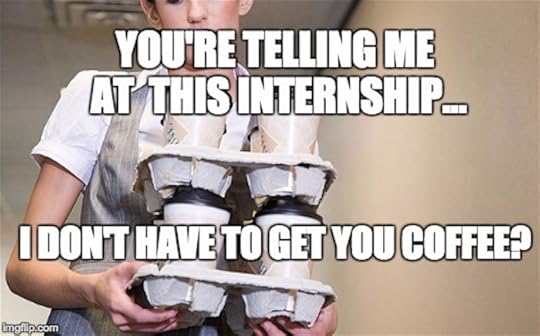 It took a literal intervention from the TED Fellows program and constant prodding from friends, but I’m finally doing this: I need an intern.
It took a literal intervention from the TED Fellows program and constant prodding from friends, but I’m finally doing this: I need an intern.
Not a get-me-coffee intern (although that would be great! GIVE ME ALL THE COFFEES!), but someone who is passionate and wants to make a meaningful contribution to this work and the overall mission.
Full details and official write-up below.
Overview
Will Potter is an award-winning investigative journalist and author based in Washington, D.C. He specializes in the animal rights and environmental movements, and civil liberties post-9/11. His work has been featured in the world’s top media outlets, including the Washington Post, National Geographic, and Rolling Stone. He has testified before the U.S. Congress as the only witness opposing the Animal Enterprise Terrorism Act, and his book, Green Is The New Red, was awarded a Kirkus Star for “remarkable merit.” His reporting has overturned criminal prosecutions, and has both been praised in Congressional reports and monitored by the Counter-Terrorism Unit. This year he was selected as a TED Senior Fellow.
Will Potter is looking for an intern from now through the end of December, with the possibility of extension.
An intern will help with day-to-day tasks in support of GreenIsTheNewRed.com and Will Potter’s investigations and outreach.
Note Will Potter is based in Washington, DC, and the internship will operate remotely.
Qualifications
Available for the full program dates (now through December, 2015)
Committed to working 10-20 hours per week (flexible schedule)
Strong editorial skills
Organizational skills — managing the day to day of this kind of work means wearing a lot of hats
Experience with social media management
Loves continuously analyzing and optimizing processes and tasks (how can we make this better, more efficient, more effective — both with social media and real-world tasks)
Ability to meet deadlines
Self-starting and self-motivating
Able to handle multiple tasks
Passionate about social justice
Responsibilities
Helping manage and grow the social media presence for GreenIsTheNewRed and Will Potter
Coordinating guests posts and content for GreenIsTheNewRed.com, and potentially writing pieces
Researching for articles and book chapters
Media outreach, scheduling, and coordination
Other tasks as needed
Opportunities
Gain hands-on experience with media, research, and investigative journalism
Play a vital role in the day-to-day operations of GreenIsTheNewRed.com and Will Potter’s speaking and media outreach
Make a difference for animals, the environment, and free speech by exposing corporate attempts to label protest as “terrorism”
To Apply:
Email media@willpotter.com with the subject line “internship.” Include a paragraph or two about why you are interested in the internship, and attach your resume and links to published work.
Please feel free to email media@willpotter.com if you have any questions.
All materials must be received by 5pm eastern on Friday, August 21st.
Do you want to intern with Will Potter and GreenIsTheNewRed.com? from Green Is The New Red
July 28, 2015
4 Activists Arrested for Chalking “Save the Animals”
 Four animal rights activists have been arrested for allegedly writing political slogans on the public street using sidewalk chalk.
Four animal rights activists have been arrested for allegedly writing political slogans on the public street using sidewalk chalk.
The four were arrested in Beaverton, Oregon, and face charges of harassment, criminal mischief, and disorderly conduct.
The chalking was done as part of the growing “No New Animal Lab” campaign, which aims to stop the construction of a new underground animal experimentation facility at the University of Washington.
Activists have been protesting Skanska, an international construction firm hired to build the lab, and there have been protests at the home of David Schmidt, the Northwest Regional Co-Chief Operating Officer of Skanska, who signed the lab contract.
Washable sidewalk chalk was used to write on the sidewalk and public street. Phrases included “No new animal lab,” and “Save the animals.”
There have been protests in Schmidt’s neighborhood, some of which included activists chanting slogans. When they were chalking on the evening of July 22nd, though, the four activists arrested were not chanting or protesting.
The activists, who asked to not be identified as their charges are pending, said in interviews that when police arrived, they did not ask any questions or attempt to speak with them; the police immediately told them not to move and that they were all being detained. They were then transported separately to jail.
Their attorney, Lauren Regan of the Civil Liberties Defense Center, said that chalking slogans is clearly First Amendment protected activity.
“Law enforcement have a duty to uphold the constitutional rights of all citizens, and not merely to do the bidding of large corporations who seek to silence their critics,” she said. “In this instance, the police appear to be clearly violating the First Amendment rights of activists, which undoubtedly includes using sidewalk chalk to write slogans on public sidewalks, which are traditional public forums that provide the most expansive protection for free speech.”
The arrests accompany an escalating effort by Skanska to shut down the protests; in Seattle, the company obtained restraining orders against activists, prohibiting them from protesting company executives.
The four have an arraignment hearing on August 4th.
Meanwhile, they are continuing the campaign against Skanska, with a week of protests this week and a second march at the University of Washington planned for October 2nd.
4 Activists Arrested for Chalking “Save the Animals” from Green Is The New Red
July 24, 2015
BREAKING: 2 Activists Accused of Freeing Animals are Charged as Terrorists
 The FBI arrested two animal rights activists today for allegedly freeing mink and other animals from fur farms, and vandalizing the property of animal-abusing businesses.
The FBI arrested two animal rights activists today for allegedly freeing mink and other animals from fur farms, and vandalizing the property of animal-abusing businesses.
Joseph Buddenburg, 31, and Nicole Kissane, 28, were charged under the Animal Enterprise Terrorism Act, a 2006 law that reclassified a wide range of petty criminal activity as “terrorism” if done in the name of harming the profits of animal enterprises.
The government alleges that since the summer of 2013 the two caused hundreds of thousands of dollars in damage to corporations that they viewed as being cruel to animals. They are alleged to have freed 6,000 animals, including mink and bobcat, from fur farms in Idaho, Iowa, Minnesota, Wisconsin and Pennsylvania.
They’re also alleged to have traveled the west coast of the U.S. and used super glue and glass etching fluid to vandalize the property of fur retailers. Companies targeted included Furs by Graf, a retail shop in San Diego, and another fur shop in Minneapolis.
Buddenburg and Kissane are charged with conspiracy to violate the Animal Enterprise Terrorism Act, and are facing up to 10 years in prison.
Sending a Message
The arrests come in the lead-up to the national animal rights conference in Washington, DC — an event that gathers hundreds of animal rights activists from around the U.S., and dozens of international guests.
The FBI did the exact same thing last year, when agents arrested two animal rights activists and charged them violating the Animal Enterprise Terrorism Act. In that case, like this one, the activists are accused of releasing thousands of animals from fur farms.
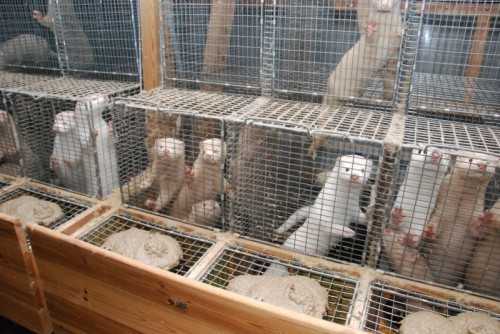 In these and many other cases, the FBI uses rhetoric of terrorism in its press releases and sound bites, invoking the power of the word before these activists have even entered the courtroom.
In these and many other cases, the FBI uses rhetoric of terrorism in its press releases and sound bites, invoking the power of the word before these activists have even entered the courtroom.
“Whatever your feelings about the fur industry, there are legal ways to make your opinions known,” said U.S. Attorney for the Southern District of California Laura Duffy. “The conduct alleged here, sneaking around at night, stealing property and vandalizing homes and businesses with acid, glue, and chemicals, is a form of domestic terrorism and can’t be permitted to continue.” [emphasis added]
What Duffy fails to note is that the only thing that turns breaking windows into “domestic terrorism” in this case is that the accused are animal rights activists. If these crimes had been committed for any other purpose, it could not be charged under the law. And it would not be receiving the FBI’s public relations efforts.
That message and its timing are not lost on the animal rights activists gathering in Washington this week. As I have reported extensively on this site and in my book, the FBI’s disproportionate focus on animal rights activists, and public messages like this one, has made everyday activists afraid of attending protests.
It’s telling that Joseph Buddenburg, one of those arrested, was also one of the first people ever indicted under the Animal Enterprise Terrorism Act, in 2009; the AETA 4 were accused of chanting, protesting, and writing slogans on the public streets with sidewalk chalk. That case was dismissed.
Misplaced Priorities?
The arrests come on the heels of a string of shootings, hate crimes, and other violent attacks that have made international headlines.
As the Washington Post reports, there have been 204 shootings in 2015 so far. That’s 204 shootings in 204 days.
ABC notes, “Mass Shootings in US Increasingly Common and Deadly.”
And, as I’ve reported here, there has been a 400 % increase in violence by right-wing groups since the 90s.
Meanwhile, this case alone involved the coordination of several FBI Joint Terrorism Task Forces. Through it all, the FBI continues to focus valuable law enforcement resources on animal rights and environmental activists as as the “number one domestic terrorist threat.”
If they are convicted, they face prison sentences higher than those of racist cross burners.
BREAKING: 2 Activists Accused of Freeing Animals are Charged as Terrorists from Green Is The New Red
July 15, 2015
Democracy Now Covers SeaWorld’s Dirty Tricks
 I had the pleasure of being on Democracy Now today to talk about how a Sea World employee was busted attempting to infiltrate PETA.
I had the pleasure of being on Democracy Now today to talk about how a Sea World employee was busted attempting to infiltrate PETA.
PETA attorney Matthew Strugar and volunteer Hal Weiss explained how “Thomas Jones,” who attended PETA protests and was arrested at a demonstration, was exposed as a corporate spy.
I talked about how this fits into a broader pattern of dirty tricks by corporations against political activists, and how they are operating without oversight or accountability.
As I noted on the program:  “When people make a lot of money by abusing animals, they don’t like having that abuse exposed. It means they lose profits, because consumers don’t like that very much. That’s exactly what’s happened with Sea World and Blackfish. It’s really unprecedented amazing how quickly the tides have turned against this company…
“When people make a lot of money by abusing animals, they don’t like having that abuse exposed. It means they lose profits, because consumers don’t like that very much. That’s exactly what’s happened with Sea World and Blackfish. It’s really unprecedented amazing how quickly the tides have turned against this company…
I think these types of tactics, that I’ve reported on extensively, are truly an act of desperation when activists become incredible effective at changing cultural values, cultural discussion, and threatening corporate profits.”
Sea World refused to be on the show. But they issued a written statement to Democracy Now about how these tactics are needed because of animal rights “extremists.”
Attorney Matthew Strugar pointed out the absurdity of such a statement:
“It’s a bizarre response that they say they are concerned about safety when it was their own employee who had the most inflammatory rhetoric of any anti-Sea World activist.”
Check out the full video on Democracy Now or watch below:
Democracy Now Covers SeaWorld’s Dirty Tricks from Green Is The New Red
July 14, 2015
Sea World Employee Busted Infiltrating PETA
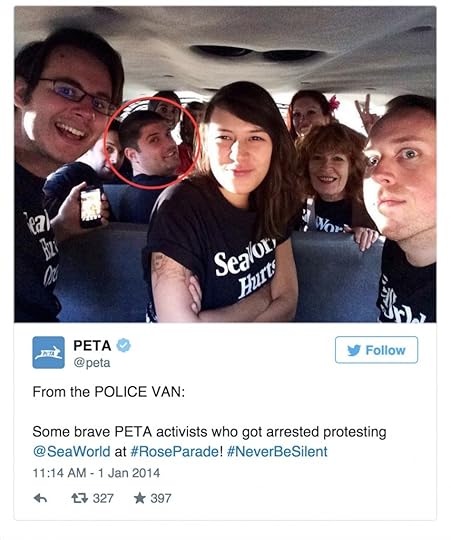 A Sea World employee has been posing for years as a PETA activist in an attempt to infiltrate animal rights protests against the failing company.
A Sea World employee has been posing for years as a PETA activist in an attempt to infiltrate animal rights protests against the failing company.
The corporate spy has protested Sea World at New York’s Thanksgiving Day parade and even been arrested with PETA activists at the Rose Parade in 2014.
The man had identified himself as Thomas Jones, but PETA exposed his true identity as 28-year-old Paul McComb, who works in Sea World’s human resources department.
“Time to take down Sea World”
One of the red flags that alerted PETA was McComb providing the group his address, which was a PO Box also used by Richard Marcelino, Sea World’s head of security.
McComb also used social media to spy on and seemingly instigate protest activity. In one message, he said: ““What is the big surprise for the upcoming protest. Are we going up the gates or something?”
In another, he urged activists, “Grab your pitch forks and torches. Time to take down SeaWorld.”
 Sea World blames “extreme” animal rights groups for its spying
Sea World blames “extreme” animal rights groups for its spyingAfter being outed, Sea World hasn’t denied it’s covert operations. In a statement to Bloomberg, Sea World said that PETA hires investigators, too, and provided a link to a PETA job posting.
“We are focused on the safety of our team members, guests and animals, and beyond that we do not comment on our security operations,” Fred Jacobs, a SeaWorld spokesman, said in a statement Monday. “This is a responsibility that we take very seriously, especially as animal rights groups have become increasingly extreme in their rhetoric and tactics.”
A history of corporate espionage
Unfortunately, tactics like this are nothing new, especially in cases where activists have been increasingly effective at threatening corporate profits.
Coca Cola has also hired a spy firm, Stratfor, to investigate PETA.
Burger King hired a corporate espionage team to spy on the Student/Farmworker Alliance.
In the 1980s, a vivisection company, US Surgical, hired a corporate spy firm called Perceptions International to infiltrate and disrupt animal rights groups. A woman named Mary Lou Sapone infiltrated protest groups, and she prodded and coerced an activist named Fran Trutt into a bomb plot.
The plot failed, but it was US Surgical that was “increasingly extreme,” as Sea World says — not animal rights groups. [Here’s a detailed history of the US Surgical infiltration.]
“Little research on newcomers”
 An FBI document I wrote about several years ago shines a light on the challenge informants pose to social movements: protest groups need to be welcoming of new members, but they also need to be skeptical of surveillance and disruption.
An FBI document I wrote about several years ago shines a light on the challenge informants pose to social movements: protest groups need to be welcoming of new members, but they also need to be skeptical of surveillance and disruption.
“The Animal Rights Movement does little research on newcomers into the movement and basically goes with its gut instinct as to whether a person is an informant or not. Organizers of the Animal Rights Movement can be discredited and removed from the scene by planting rumors that they are plants and/or informants.” [emphasis added]
In this case, PETA did everything right — rather than spreading rumors or gossiping, PETA activists did their research, obtained photos, and confirmed what was happening.
However, the real danger of these “dirty tricks” by Sea World is that they may make activists distrust one another, and distract themselves from the campaign.
As Sea World attendance and share prices plummet, and as celebrities like Willie Nelson and companies like Southwest Airlines sever ties, that might be exactly what the company wants.
Sea World Employee Busted Infiltrating PETA from Green Is The New Red
July 5, 2015
Investigator Speaks As She Heads to Jail for Exposing Factory Farm Cruelty
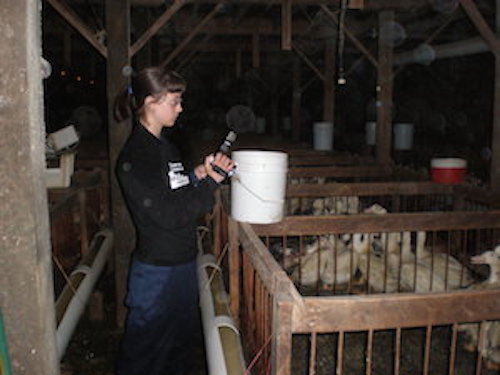 A few days ago, animal rights activist Amber Canavan began a jail sentence for photographing and rescuing several ducks from Hudson Valley Foie Gras, where ducks are force-fed until their livers are engorged.
A few days ago, animal rights activist Amber Canavan began a jail sentence for photographing and rescuing several ducks from Hudson Valley Foie Gras, where ducks are force-fed until their livers are engorged.
She was originally charged with felony burglary and petty larceny, which could have meant up to 7 years in prison. After 3 years of legal proceedings, the charges were reduced and she plead guilty to misdemeanor trespass.
As part of her sentence, she will not be compelled to identify any other investigators, or pay any restitution to the farm.
I spoke with Amber Canavan just days before she began her jail sentence:
Why are you going to jail?
Amber Canavan: “I was recently convicted of criminal trespass for my part in an undercover investigation and open rescue of two ducks from a massive foie gras duck force feeding facility in New York. Foie gras is the liver of a duck who has been force-fed an unnatural amount of corn gruel, resulting in a diseased, fattened liver. This engorged liver is served as a delicacy in a relatively small number of restaurants across the country. This intensive force-feeding process, combined with standard factory farm conditions, cause the ducks extreme discomfort, illness, and death.
I have been a volunteer for the Animal Protection and Rescue League for a number of years, and I became more involved when APRL launched a number of investigations into the foie gras industry. I was on the east-coast team, charged with checking in to Hudson Valley Foie Gras, which is located a few hours from my hometown, and whose proximity had weighed on my mind for years.
The investigation itself went off without a hitch. While there, our team collected many hours of footage, and rescued two traumatized ducks. We discovered that almost all of the birds suffered from untreated sores, respiratory disease, and many had broken limbs. One duck was found with a wound on his throat, which was oozing pus, apparently from improper insertion of the metal force-feeding tube. Others were found dead, often with gruel pouring from their beaks.
The footage was shared and used by many organizations in their campaigns. Unfortunately, it was shared a little too freely, and the District Attorney came into possession of the raw footage, as well as my name. I was arrested in May 2013, two years after the investigation and rescue took place.”
This has been a very lengthy ordeal. Could you tell us about how it was finally resolved in this way?
Amber Canavan: “First of all, at the time of my arrest, I was a full-time student (I have since graduated), so the delays between arrest and indictment, while quite arduous, probably prevented me from being expelled. As is, I was placed on disciplinary probation by my college for apparently violating their student code of conduct by being arrested.
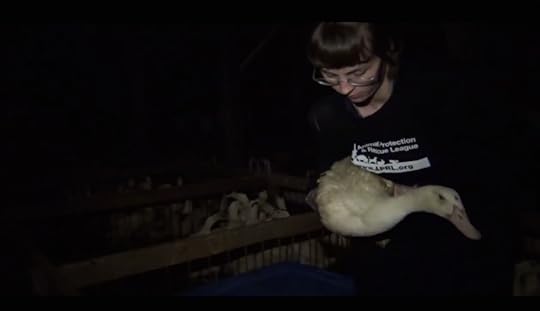 I was initially charged with felony burglary and petit larceny, and the prosecution was adamant that I serve serious jail time, even though I was a first time offender. It took a lot of time and some solid legal work to get to this resolution. Finally, at a court hearing on June 3rd, 2015, with the farm’s manager decked out in filthy muck boots, and practically breathing down my neck, I testified in open court that I visited the farm, documented egregious conditions, and delivered two ducks into lifesaving medical care. The judge imposed an Order of Protection against me in addition to the 30 day jail term on the conditions that the other people on the investigation team and the two rescued ducks would remain safe and free.”
I was initially charged with felony burglary and petit larceny, and the prosecution was adamant that I serve serious jail time, even though I was a first time offender. It took a lot of time and some solid legal work to get to this resolution. Finally, at a court hearing on June 3rd, 2015, with the farm’s manager decked out in filthy muck boots, and practically breathing down my neck, I testified in open court that I visited the farm, documented egregious conditions, and delivered two ducks into lifesaving medical care. The judge imposed an Order of Protection against me in addition to the 30 day jail term on the conditions that the other people on the investigation team and the two rescued ducks would remain safe and free.”
What do you think have been the most important lessons learned from this experience (both personally and politically)?
Amber Canavan: “Both personally and politically, I had to confront that sometimes what needs to be done has consequences, but you do it anyway. Sometimes there is so great of an opportunity that warrants taking the risk of going to jail. If you think it’s bad for the animals (or the environment or any oppressed group) just from what you’ve seen from video or pictures, I assure you it is far worse. Our urgency to free them should be as acute as their urgency to be free.
There are a million ways to engage in making change that doesn’t include going to jail, but pushing legal boundaries is integral for any social justice struggle. Often the only thing keeping us from making a huge impact is our own hesitations.”
We have talked a bit about your case in relation to others, such as what’s going on in Australia, or ag-gag laws here in the U.S. What do you think that connection is?
Amber Canavan: “Ag-gag laws are a symptom of the effectiveness of the movement’s use of whistle blowers. As we saw with my case, and many others, such as Patty Mark’s arrest in Australia, prosecutors already have the tools they need to silence and persecute whistle blowers. The prosecution in my case made a big deal about the missing ducks, whose value was a mere $100. Many people believe the real reason I have been prosecuted was the extent of my involvement and openness in advocating for all of the ducks we had to leave behind that night. It was not my actions, but my voice that invited this prosecution. That is what the industry is really worried about, not the loss of a few individual animals.
If a tactic (such as undercover investigations) is too effective at making change, and if that change threatens powerful interests, they will probably find a way to criminalize that tactic. If activists become too bold, they will find a way to scare them into submission, such as with the AETA. That is why tactics need to be ever-evolving, and activists need to cultivate a reserve of courage. As long as activists keep it up, the industry will find other ways to buffer themselves from public scrutiny, but a truth this big can’t stay hidden for long. No matter how much money and power they have, we will always be there to nonviolently intervene.”
What can people do to support you?
Amber Canavan: “I went through all of this to bring some relief for the animals. I would much rather folks do something for the animals in my honor than anything else. I’m only going to be confined for a few weeks, but the animals won’t have that relief unless we stand up for them.
That being said, there are a number of ways to support me while I’m in jail, such as writing, visiting, or sending me reading material. Details for jail support will be posted on my support page at www.facebook.com/supportforamber. Donating to my legal fund by choosing “Animal Cruelty Investigator Legal Defense” at www.aprl.org/contribute.html would also be a huge help.”
Please write Amber while she is in jail:
Sullivan County Jail
C/O Amber Canavan
4 Bushnell Ave
Monticello, NY 12701
Investigator Speaks As She Heads to Jail for Exposing Factory Farm Cruelty from Green Is The New Red
June 25, 2015
New “Rise Above Factory Farming” Totes!
Jose Valle and the team at Igualdad Animal are hands down some of the smartest and most effective activists I’ve ever met, so I was excited to receive this photo from him with his new “Rise Above Factory Farming” tote bag that I made.
The totes are 15″ x 15″ with 10″ black handles. They’re a thick canvas, and wide enough so you can actually carry stuff. They are only $10 on the GreenIsTheNewRed.com store, and all sales go straight into keeping this site running.
New “Rise Above Factory Farming” Totes! from Green Is The New Red
June 16, 2015
Environmentalists, leftists from the 1970s top FBI domestic terrorist list (Video)
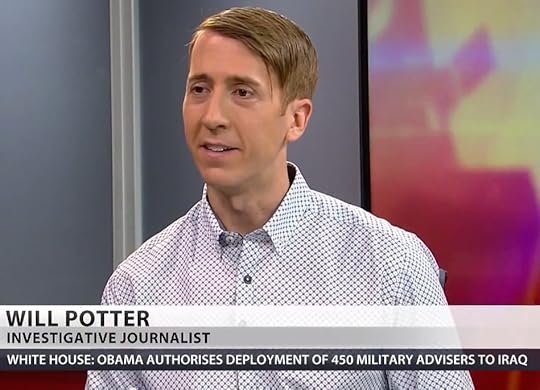 I recently was interviewed by Lindsay France about the FBI’s domestic terrorism priorities, and about my article “5 Reasons Why the FBI’s Most Wanted Domestic Terrorists List Should Have You Outraged.”
I recently was interviewed by Lindsay France about the FBI’s domestic terrorism priorities, and about my article “5 Reasons Why the FBI’s Most Wanted Domestic Terrorists List Should Have You Outraged.”
As I have reported here extensively, the FBI focuses on environmentalists and animal rights activists as “domestic terrorists” while violence by right-wing groups has increased 400% since the 1990s (for a detailed looked at the West Point study of right-wing extremism, check out this article).
Thanks to Lindsay for having me on the show! You can watch it below…
Environmentalists, leftists from the 1970s top FBI domestic terrorist list (Video) from Green Is The New Red
June 11, 2015
Here’s How #AgGag Made it Illegal to Expose Abuse at Daycares
 North Carolina’s new ag-gag law is a sweeping attack on whistleblowers, journalists, and anyone who documents abuse at a wide-range of facilities.
North Carolina’s new ag-gag law is a sweeping attack on whistleblowers, journalists, and anyone who documents abuse at a wide-range of facilities.
The law, which was vetoed by the governor and then overridden, lets businesses sue employees who expose what happens on the job, even if it what they are exposing is illegal.
It has dangerous implications for vulnerable groups in every segment of society, which is why it was opposed by AARP, veterans’ groups, and domestic violence organizations.
But these types of laws started out as an attempt to shut down undercover investigations of factory farms. So what changed? How has ag-gag gone from bad to worse, and how have we gotten to his point?
I spoke with VICE News about the trend:
Nationwide, ag-gag laws have evolved, says Will Potter, who documented government surveillance and prosecution of environmentalists in his book Green Is the New Red.
“Originally these laws were explicitly targeting animal welfare groups and explicitly prohibiting photography,” he told VICE News. “That didn’t go [over] very well with the public.”
But legislatures have continued to discuss bills on whistleblower activity, said Potter, and have tried to include requirements that job applicants disclose if they have worked for animal rights groups. Other ag-gag laws proposed to require workers to submit to their employers — or the police — any footage they had taken.
North Carolina’s law doesn’t mention agriculture, specifically, and instead focuses broadly on businesses.
“That’s all bullshit,” Potter said. “This is about undercover video and they’re just trying to package it in a new way to try to sneak it through.”
Well, it’s not exactly my most eloquent defense of civil liberties! (Sorry, Mom). But sometimes you just have to cut the euphemisms and call a lie a lie.
North Carolina’s ag-gag law is not about intellectual property. It’s not about financial secrets. It’s about silencing whistleblowers who expose practices that are bad for business.
Here’s How #AgGag Made it Illegal to Expose Abuse at Daycares from Green Is The New Red





